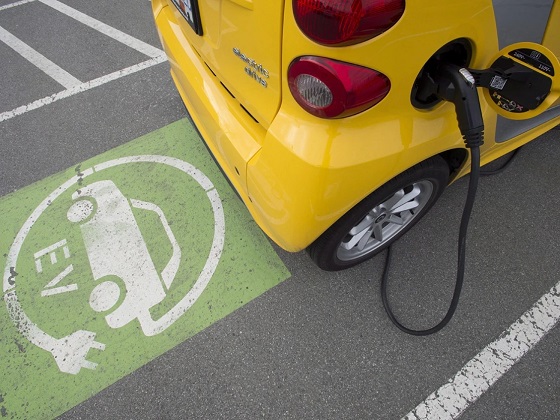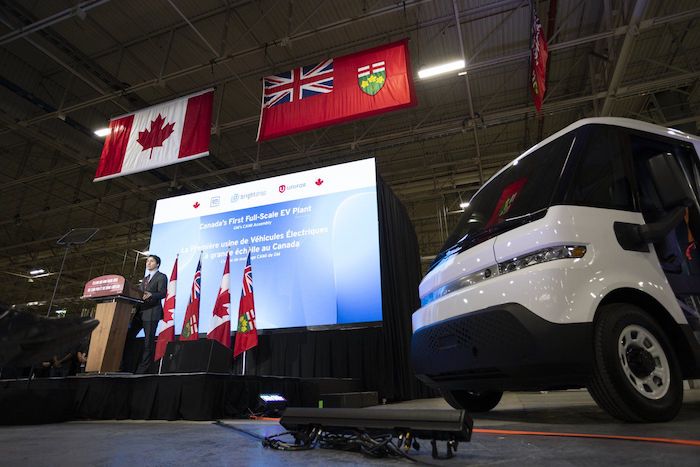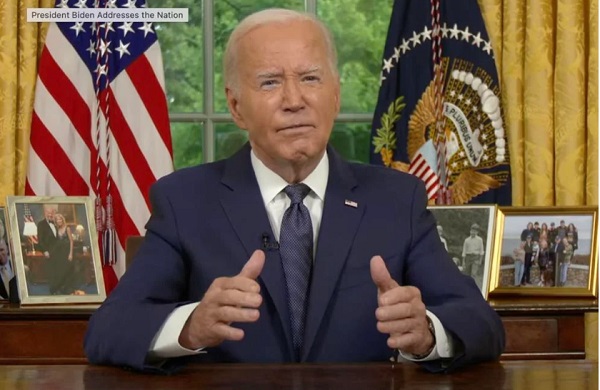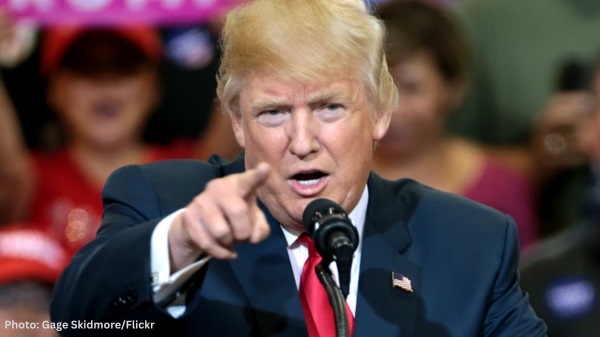Automotive
Forget Tariffs: Biden Should Look to Domestic Mining to Thwart Chinese EVs

Fr0m Heartland Daily News
By Rick Whitbeck
The Biden administration’s decision to raise tariffs on Chinese-manufactured electric vehicles, steel, computer chips, and other technological products is the epitome of a penny wise and a pound foolish.
To much of the nation, the news was a reelection flip-flop, or an attempt to prop up the electric vehicle industry Biden has prioritized since he took office, as part of his green agenda. The international supply chain for electric vehicles isn’t going to magically stop running through the Chinese Communist Party anytime soon.
If Biden really wanted to curb Chinese geopolitical power, he would make fundamental changes to his administration’s history of attacking domestic mining opportunities. Allowing development of copper, graphite, nickel, cobalt, and other critical and strategic minerals right here at home would go much further than imposing tariffs.
Biden has demonstrated affinity for promoting “net zero” policies and forcing transitions away from traditional energy supplies of oil, gas, and coal. In a nutshell, the attacks on domestic mining projects seem completely counterproductive.
According to the International Energy Agency, staggering quantities of subsurface elements will need to be mined by at least five times their current worldwide production by 2040 to meet the Biden administration’s green energy goals. Graphite, cobalt, and lithium all will be needed in quantities exceeding 25 times (or more) their current supplies. In the next quarter century, we will need twice as much copper than has been produced in the last 3,000 years. All of which is impossible when Biden won’t let us dig.
The U.S. has tremendous opportunities to have our own mineral resources. Yet, the Biden administration has thwarted their development at nearly every turn. For example, massive copper and nickel deposits could be developed in Minnesota at the Twin Metals and Duluth Complex projects, but Biden has ordered each of them off-limits for development. The Resolution Copper prospect in Arizona met a similar fate, with the Department of Interior placing on “indefinite hold” its approval.
The Western Hemisphere’s largest copper prospect is Alaska’s Pebble Mine. Kowtowing to environmental extremists—and ignoring a clean U.S. Army Corps of Engineers’ Final Environmental Impact Statement—the Environmental Protection Agency continues to stymie progress on a deposit worth more than $500 billion. All the while shutting down the possibility of 700 full-time jobs in an area of rural Alaska that has seasonal unemployment exceeding 20%.
Alaska has been the target of more than 60 administrative and executive orders targeting its resource-based economy since Biden assumed office. One of the most recent took place on Earth Day, when a congressionally-authorized road to the Ambler Mining District—an area rich in copper, zinc, and other strategic and critical minerals—was stopped by the Department of Interior.
Just like with the Resolution mine in Arizona, the Interior Department used “Indigenous opposition” as its deciding factor, even though many villages and tribes closest to the mining district publicly support the project and its future employment opportunities. In Alaska, the Biden administration literally blocks the road to the minerals Biden’s tariffs claim to protect.
Alaska’s governor, Michael Dunleavy, along with its entire congressional delegation, has been openly critical of the continued hypocrisy of the Biden administration when it comes to talking “net zero” and acting with vigor to oppose domestic mining projects. The same response has come from many within the Minnesota and Arizona congressional community. They’ve been unable to break through to the administration, as Team Biden chooses to listen to eco-activists and career bureaucrats with an anti-development agenda.
What would hurt China, empower America, and begin to chip away at the global imbalance would be mining and processing our crucial minerals and elements domestically. Let’s see if the Biden administration wises up to that fact, or if America tires of being subservient to the CCP and makes fundamental changes to federal leadership in November.
Rick Whitbeck is the Alaska State Director for Power The Future, a national nonprofit organization that advocates for American energy jobs and fights back against economy-killing and family-destroying environmental extremism. Contact him at [email protected] and follow him on X (formerly Twitter) @PTFAlaska
This article was originally published by RealClearEnergy and made available via RealClearWire.
To read more about domestic mining to escape reliance on China, click here.
To read more about clean energy and mining, click here.
Automotive
It’s Time To Abandon Reckless EV Mandates

From Canadians for Affordable Energy

Already, billions of tax dollars have been handed out in subsidies to companies that have no accountability to the Canadian taxpayer. This experiment in societal re-engineering will disproportionately harm Canadian workers and families, especially those who live in rural communities.
And it will surely fail
Canada is not nearly ready for the wholesale adoption of electric vehicles (EVs).
That was the message of the letter I sent to every member of Parliament recently, urging them to drop the “Electric Vehicle Availability Standard” introduced by the Trudeau government late last year. That’s the policy that mandates that all new vehicles sold in Canada must be electric by 2035. There is no way, considering the economic, technological and infrastructural realities of our country — and our world — where this is possible.
Stubbornly attempting to achieve this goal would do serious damage to our economy, leaving Canadian taxpayers on the hook for generations to come. Already, billions of tax dollars have been handed out in subsidies to companies that have no accountability to the Canadian taxpayer. This experiment in societal re-engineering will disproportionately harm Canadian workers and families, especially those who live in rural communities.
And it will surely fail. In my letter I highlight a few of the central reasons why staying the course on EV mandates by 2035 is extremely reckless. Right off the bat, the technology is simply not there for electric vehicles to be a reliable source of transportation in Canada’s climate. The batteries cannot hold their charge in frigid temperatures. Forcing Canadians to rely on vehicles that can’t handle our winters is irresponsible and dangerous.
Electric vehicles’ cost is another issue. Right now, the EV market relies heavily on government subsidies. These subsidies can’t last forever. But without them EVs are prohibitively expensive. Even with them, the costs of maintaining an EV are high. Replacing a damaged battery, for example, can cost upwards of $20,000. Mandating that people buy vehicles they can’t afford to either purchase in the first place or maintain if they do buy them is political malpractice.
A fact long ignored by decision-makers in Ottawa is that our electrical grid isn’t ready for the excess demand that would come with widespread EV adoption. These mandates, paired with the government’s goal of fully decarbonizing the grid by 2035, put us on a collision course with the reality of unreliable power. A grid powered, not by reliable fossil fuels, but by spotty wind and solar energy would be further burdened with millions of cars relying exclusively on electricity.
Beyond the electricity itself, the EV mandates will require additional transmission and distribution capacity. But there are no signs any plan is in place to expand our transmission capacity to meet the 2035 target.
The sheer number of new charging stations required by wholesale adoption of EVs will strain our distribution networks. Natural Resources Canada projections show that Canada will need between 442,000 and 469,000 public charging ports by 2035. At the moment, we have roughly 28,000. And that doesn’t include the private charging stations people will need to install at home. Closing that gap in such a tight time frame is almost certainly impossible.
All of those considerations aside, at a fundamental level the government’s push for electric vehicles encroaches on the operation of the free market, all in the name of emissions reductions. The Canadian economy is founded on the market principle that the consumer drives the economy (no pun intended). Thousands of times over, it has been shown that if there is enough demand for a product, supply soon follows. In the case of EVs, however, the federal government is operating under the assumption that if you somehow create a supply, that will inspire a demand.
This hasn’t worked in any of the countries where it’s been attempted, which is why nations around the world have started to tap the brakes on EV mandates. Decision-makers in Ottawa need to follow suit and abandon these reckless and costly mandates. Let the market decide when EVs are ready for prime time. In other words, let Canadians decide.
Dan McTeague is President of Canadians for Affordable Energy
Automotive
Many Gen Z and millennial Canadians don’t believe in EV corporate welfare

From the Fraser Institute
By Tegan Hill and Jake Fuss
The Parliamentary Budget Officer recently estimated federal government support for EV initiatives will cost Canadian taxpayers $31.4 billion, which represents roughly $1,043 per tax filer.
According to a new Leger poll, a significant percentage of Gen Z and millennial Canadians don’t believe that billions of dollars in government subsidies to build electric vehicle (EV) plants—including $5 billion to Honda, $13.2 billion to Volkswagen and $15 billion to Stellantis—will benefit them. And based on a large body of research, they’re right.
The poll, which surveyed Canadians aged 18 to 39 who are eligible to vote, found that only 32 per cent of respondents believe these subsidies (a.k.a. corporate welfare) will be of “significant benefit to your generation” while 28 per cent disagree and 25 per cent are on the fence.
Unfortunately, this type of taxpayer-funded corporate welfare isn’t new. The federal government spent an estimated $84.6 billion (adjusted for inflation) on business subsidies from 2007 to 2019, the last pre-COVID year of data. Over the same period, provincial and local governments spent another $302.9 billion on business subsidies for their favoured firms and industries. And these figures exclude other forms of government support such as loan guarantees, direct investments and regulatory privileges, so the actual cost of corporate welfare during this period was much higher.
The Trudeau government has shown a particular proclivity for corporate welfare. According to a recent study, federal subsidies have increased by 140 per cent from 2014/15 to 2023/24. But again, the money used to fund these subsidies isn’t free—its funded by taxpayers. The Parliamentary Budget Officer recently estimated federal government support for EV initiatives will cost Canadian taxpayers $31.4 billion, which represents roughly $1,043 per tax filer.
And Canadians are right to be skeptical. Despite what the Trudeau or provincial governments claim, there’s little to no evidence that corporate welfare creates jobs (on net) or produces widespread economic benefits.
Instead, by giving money to select firms, the government simply shifts jobs and investment away from other firms and industries—which are likely more productive, as they don’t require government funding to be economically viable—to the government’s preferred industries and firms, circumventing the preferences of consumers and investors. If Honda, Volkswagen and Stellantis are unwilling to build their EV battery plants in Canada without corporate welfare, that sends a strong signal that those projects make little economic sense.
Finally, higher taxes (or lower government spending in other areas) ultimately fund corporate welfare. And higher taxes depress economic activity—the higher the rates, the more economic activity is discouraged.
Unfortunately, the Trudeau government believes it knows better than investors and entrepreneurs, so it continues to use taxpayer money to allocate scarce resources—including labour—to their favoured projects and industries. And since politicians spend other people’s money, they have little incentive to be careful investors.
Canadians, including young Canadians, are right to be skeptical of corporate welfare. As the evidence suggests, there’s little reason to think it will lead to any economic benefit for them.
Authors:
-

 International19 hours ago
International19 hours agoSecret Service Repeatedly Rejected Offers To Use Drones At Deadly Trump Rally, Whistleblower Says
-

 Alberta1 day ago
Alberta1 day ago‘Fireworks’ As Defence Opens Case In Coutts Two Trial
-

 Business1 day ago
Business1 day agoEstonia’s solution to Canada’s stagnating economic growth
-

 International19 hours ago
International19 hours agoHouse Passes Bipartisan Resolution Establishing Trump Assassination Attempt Task Force
-

 Bruce Dowbiggin12 hours ago
Bruce Dowbiggin12 hours agoGarbage In, Garbage Out: The Democrats 2024 Election Coup
-

 COVID-191 day ago
COVID-191 day agoLeaked documents: German gov’t lied about shots preventing COVID, knew lockdowns did more harm than good
-

 Business1 day ago
Business1 day agoFederal government seems committed to killing investment in Canada
-

 International1 day ago
International1 day agoSwitzerland’s new portable suicide ‘pod’ set to claim its first life ‘soon’









